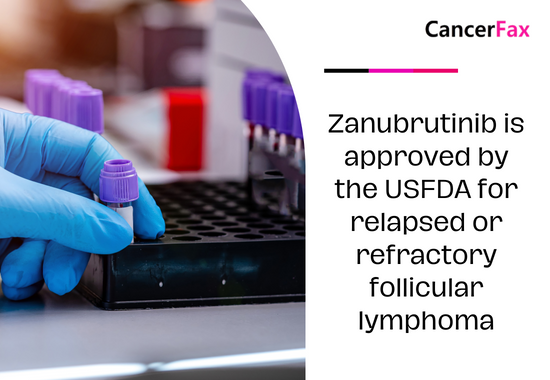March 2024: Zanubrutinib (Brukinsa, BeiGene USA, Inc.) in combination with obinutuzumab has been granted accelerated approval by the Food and Drug Administration for the treatment of relapsed or refractory follicular lymphoma (FL) in patients who have had two or more lines of systemic therapy.
The effectiveness of the medication was assessed in Study BGB-3111-212 (ROSEWOOD; NCT03332017), which was a clinical trial including 217 adult patients with relapsed or refractory follicular lymphoma (FL) who had undergone at least 2 previous systemic therapies. The experiment was conducted at many centers and was open-label and randomized. The patients were randomly assigned in a ratio of 2:1 to receive either zanubrutinib at a dose of 160 mg orally twice daily until the disease progresses or there is unacceptable toxicity, in combination with obinutuzumab (ZO), or to receive obinutuzumab alone. The median number of previous treatment attempts was 3, with a range of 2 to 11.
The effectiveness of the treatment was assessed by an independent review committee, based on the overall response rate (ORR) and the duration of response (DOR). The overall response rate (ORR) was 69% (95% confidence interval [CI]: 61, 76) in the ZO arm and 46% (95% CI: 34, 58) in the obinutuzumab arm (two-sided p-value, 0.0012). After 19.0 months of observation, the median duration of response (DOR) was not determined in the ZO arm (95% CI: 25.3 months, NE), while it was 14.0 months (95% CI: 9.2, 25.1) for patients who received obinutuzumab monotherapy. In the ZO arm, the estimated rate of durable objective response (DOR) at 18 months was 69% with a 95% confidence interval (CI) of 58% to 78%.
In clinical studies of zanubrutinib, the most frequently seen negative effects (occurring in at least 30% of cases), which also include abnormal laboratory results, were reduced levels of neutrophils (51%) and platelets (41%), upper respiratory tract infections (38%), bleeding (32%), and musculoskeletal discomfort (31%). ZO caused serious adverse effects in 35% of patients with FL.
The suggested zanubrutinib dose is 160 mg administered orally twice day or 320 mg administered orally once daily unless there is disease progression or intolerable toxicity.


